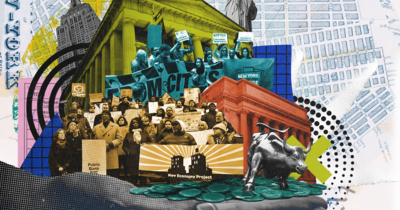
Public Banking Key to Building Community Wealth in New York City
“By shifting the focus of finance from private profits to the public welfare, public banks can begin to repair harms caused by longstanding discriminatory practices against Black and brown people.”

NEW YORK—A new report from Demos and New Economy Project calls on New York City to establish a public bank to divest city dollars from Wall Street and channel capital to Black and brown communities to promote racial equity and environmental justice.
Read the report, Banking for the Public Good: Public Bank NYC, here.
As noted in the report, every year $100 billion flows through New York City's deposit accounts with private banks. These banks finance industries—like private prisons, fossil fuels and predatory developers —that work against the public interest and systematically harm New Yorkers. If public dollars instead were held by a public bank, New York City could support investments that serve the common good.
More than a dozen bills in eight states and three major U.S. cities, including New York City, seek to pave the way for public banking. The model helps to combat predatory lending, racial wealth extraction, redlining and other practices common among big banks and emphasizes investment in local communities and democratic control over public funds.
“A public bank will support small and worker-owned businesses, community land trusts and tenant-controlled housing, and other institutions that build wealth locally,” said Andy Morrison, Associate Director at New Economy Project. “It would be the people's bank, and by leveraging the city's immense resources, it can partner with community credit unions to scale up services and reach more New Yorkers in historically-redlined communities of color.”
The movement for a public bank in New York City has accelerated during the COVID-19 pandemic. The city is experiencing a severe shortage of affordable housing, high levels of homelessness, and extreme wealth inequality, conditions that Wall Street banks have exacerbated. The New York Public Banking Act, a measure that would create a safe and appropriate regulatory framework for local public banks, has the support of dozens of state lawmakers in Albany.
“Each year, the City of New York moves tens of billions of public dollars through Wall Street banks – the same banks that persistently redline the city’s neighborhoods of color and finance private prisons, fossil fuel extraction and other destructive industries,” said Lebaron Sims, Associate Director of Policy and Research at Demos. “By shifting the focus of finance from private profits to the public welfare, public banks can begin to repair harms caused by longstanding discriminatory practices against Black and brown people.”
This case study is the third of four Demos reports on economic democracy. The series highlights the ways in which Black and brown people in the United States can — and should — have greater control over the institutions and economic forces that shape their lives.
###
Demos is a think tank that powers the movement for a just, inclusive, multiracial democracy. Through cutting-edge policy research, inspiring litigation, and deep relationships with grassroots organizations, Demos champions solutions that will create a democracy and economy rooted in racial equity.
New Economy Project works with community groups to build a new economy that works for all, based on principles of cooperation, democracy, equity, racial justice, and ecological sustainability.

